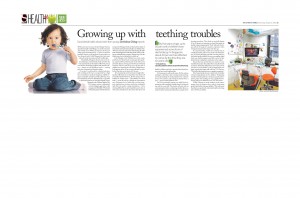 This article first appeared in the August 2, 2012 issue of the Straits Times. We have reproduced it for the information of those of you who missed it when it was published.
This article first appeared in the August 2, 2012 issue of the Straits Times. We have reproduced it for the information of those of you who missed it when it was published.
SHE may be just six years old, but Maegan Tan has already had eight tooth fillings, one tooth extraction and a dental crown. When she was five, she was put under general anesthesia for 1.5 hours so that her pediatric dentist could perform the procedures on her decayed teeth. Little Maegan burst into tears when she woke up in pain and with swollen lips.
Thankfully, Maegan’s dental caries were detected during a routine dental check-up before she even experienced any discomfort. Otherwise, it may have led to a devastating condition with extensive decay – known as early childhood caries – causing pain, loss of appetite and sleepless nights.
Or worse, it could result in a dental infection, with swelling of the face accompanied by a high fever. Considered a medical emergency, cellulitis requires immediate attention and the child may even be hospitalised, warns Dr Elizabeth Tan, a specialist in paediatric dentistry at Specialist Dental Group.
Maegan’s mum, Madam Daphne Tan, 35, a business owner, is determined not to let it happen again to her or her younger sister Meredith, “We cleared the kitchen pantry of foods that were not great for Maegan’s teeth and lessened her intake of sweet foods and snacks dramatically,” says Madam Tan. “We have since been quite strict with brushing the kids’ teeth and rinsing their mouths after meals, and are working on making flossing a practice. Maegan now visits the dentist once every six months for a check-up.”
Like Maegan, most children love sweet snacks and fruits, but these foods can damage their pearlies, cautions Dr Tan. Dental caries is one of the most prevalent diseases among preschoolers in developed countries. “By five years of age, up to 50 per cent of children have experienced some form of dental decay. In Singapore, about 40 per cent are affected by caries by the time they are six years old,” she says.
Yet, many parents aren’t worried, wrongly believing that milk teeth are not important since these will eventually fall off. However, Dr Tan stresses that a healthy set of baby teeth – “placeholders” for adult teeth – paves the way for a straight set of permanent ones. Premature loss of teeth can have long-term implications, causing crooked or misaligned teeth that can result in a range of problems – from chewing difficulties to speech problems and a loss of self-esteem. Studies have also shown that poor oral health in children can lead to impaired school performance and poor social relationships.
To keep junior’s milk teeth intact, Dr Tan advises sticking to a diet that is low in sticky, startchy and sugary foods, brushing the teeth properly twice a day for at least two minutes, and visiting the dentist twice a year – not just when problems arise.
Dr Tan recommends setting your child’s first appointment with a paediatric dentist when he is between one and two years old. The dentist will start with an oral examination before confirming whether there is a need for further treatment, followed by a simple tooth-cleaning procedure. This check-up, typically lasting 30 to 45 minutes, is important to ensure that teeth are healthy and growing properly. “Such ‘well-teeth’ check-ups will set the stage for a positive experience when visiting the dentist in the future,” Dr Tan says.
It is important that a child views a dentist visit as something routine, and not as an event to be feared, she says. So, start by bringing your little one alone with you (and other family members) for your own regular dental check-ups. Further prepare your little one for his first dental visit by reading him storybooks on the subject.
Ensure that any anxiety that you may have is not transferred to junior. Also, refrain from using the dentist as a threat. “Don’t tell a child, ‘If you eat too many sweets, you will have to see the dentist’, or ‘If you don’t brush your teeth properly, the dentist will scold you!” Dr Tan says. “This will set the dental visit up as a negative experience.”
Most importantly, choose a dentist who is familiar with providing dental care for children. “Explaining and demonstrating before a treatment, parent participation, praise and coaching are ways a paediatric dentist may help your child feel at ease,”Dr Tan assures.
While a dentist can work wonders on the ivories, parents have the biggest role to play in inculcating good dental habits in young children. “This will ensure that they have good teeth and dental health in the long term,”Dr Tan concludes
Source: Straits Times © Singapore Press Holdings Limited. Reproduced with permission





